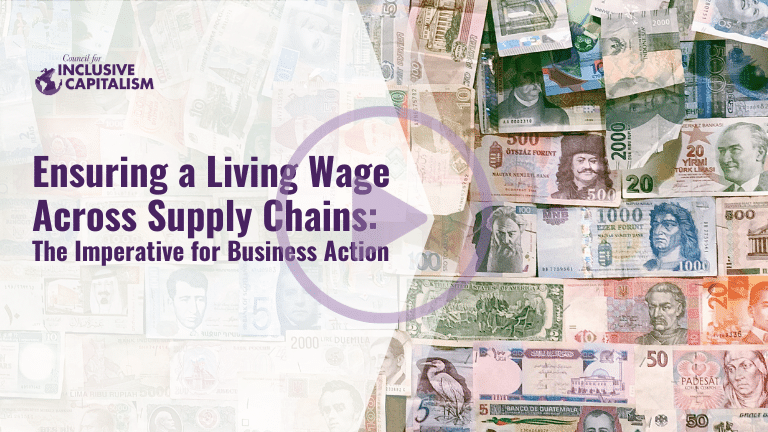Energy Companies, Investors Urge Peers to Act for a Just Energy Transition
Featured Members

The much-needed global transition to low-carbon energy cannot succeed if it isn’t just, and companies can act to ensure the best possible outcomes for people and the planet. This was the message global leaders in green finance, labor, and energy shared with a virtual audience of more than 600 investors and business leaders during a webinar hosted by the Council for Inclusive Capitalism and Ceres on Monday, June 20, 2022.
Prompted by the Council’s publication of the Just Energy Transition Framework for Company Action →, the event explored the role companies of every size and sector can play to implement an energy transition that advances both social and environmental goals. The thoughts and examples of action shared by globally recognized business leaders emphasized the importance of investing in emerging industries to create opportunities for displaced workers and encouraged leaders to partner with communities impacted by the transition to clean energy.
U.S. Secretary of Energy Jennifer Granholm opened the event discussing two of the most urgent crises facing the world: climate change and the disruption of energy supplies due to Russia’s invasion of Ukraine. Severe weather events have cost the U.S. economy alone billions in last three decades, she said and national security is also threatened. She said:
“[Putin’s invasion of Ukraine] has shown us just how vulnerable the free world remains as long as we run on fossil fuels. The national security, the energy security, implications of Putin’s war cannot be overstated. The geopolitical realignments that are happening as a result [of Putin’s invasion of Ukraine] are momentous. . . No country has ever been held hostage to access to wind and sun. They cannot be weaponized against another country.”
By responding to the needs of workers and communities that are today reliant on high-emissions energies for jobs and economic prosperity, business leaders can align company mission with broader social goals and build long-term company value.
“Put simply, it’s what the world wants, it’s what our people want, and it’s a tremendous business opportunity,” said Bernard Looney, CEO of bp. He continued:
“The need for energy security for today and accelerating the transition at the same time has never been clearer. There must not be a choice. We need both. The challenge is how to make the transition in a way that no one gets left behind. For that transition to be successful, it must be just. No one truly gets behind change if it hurts them. There will not be a transition if it is not just.”
Sharan Burrow, General Secretary of the International Trade Union Confederation, who represents more than 200 million workers worldwide, sees an opportunity for greater social prosperity if companies commit to retaining and retraining workers.
“We’re not frightened about jobs. The job story is actually a really positive one in most areas, certainly for renewable energy,” she said. “For every ten jobs in renewable energy, there are 5 to 10 in the manufacturing supply chain and there’s 30 to 35 jobs in the broader community. We need to stop the myth that there will be jobs lost. There will be jobs transferred, and that’s the labor force protection that we need.”
Mark Carney, UN Special Envoy on Climate Action and Finance, spoke to the work being done globally to outline common approaches to transition and engage financial institutions in the work said:
“A just transition is a moral, market, and practical imperative. We can’t achieve environmental sustainability if we sacrifice our economy and with it people’s livelihoods. And, similarly, we won’t get the necessary solutions or the speed that we need without market forces.”
Other key speakers in the webinar panel included:
- Mark Cutifani, former Chief Executive, Anglo American and Chairman, De Beers Group, who shared examples of how Anglo American is applying the Framework to their operations.
- Marcie Frost, CEO, CalPERS, who provided insight into how CalPERS is using the framework to engage its portfolio companies in just energy transition planning;
- Lynn Forester de Rothschild, Founder and Co-Chair, Council for Inclusive Capitalism and Founding and Managing Partner, Inclusive Capital Partners, who offered opening remarks defining the nature of a just transition and introduced the Framework;
- Anne Simpson, Franklin Templeton Global Head of Sustainability and Climate Action 100+ (CA100+) Steering Committee member, who demonstrated how its areas of action map to the Climate Action 100+ Just Transition Indicator.
Click above to watch the entire 60-minute webinar. And, visit the Council’s Just Energy Transition web page → to download the Framework for Company Action, view company commitments, and get resources including the Climate Action 100+ Net Zero Company Benchmark Framework and Methodology.




